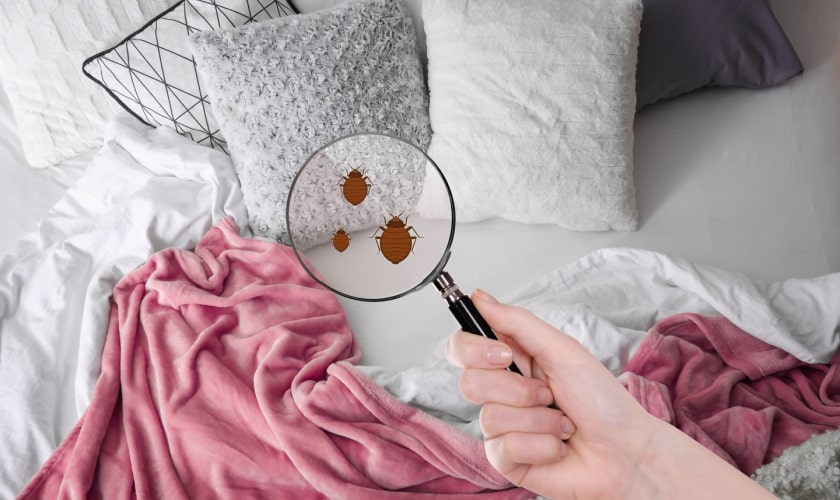Specialist Kings Pest Control Cincinnati: Your Relied On Pest control experts
Specialist Kings Pest Control Cincinnati: Your Relied On Pest control experts
Blog Article
A Break Down of the Numerous Sorts Of Bug Control Solutions
In the realm of pest control, a multitude of approaches exist to fight the visibility and resolve of undesirable animals. From the standard usage of chemical pesticides to extra cutting-edge organic control remedies, each strategy offers distinct advantages and constraints. As we navigate via the diverse landscape of parasite control options, understanding the complexities of each technique becomes extremely important in figuring out the most effective strategy. Stay tuned as we explore the nuanced globe of parasite control approaches and find just how each kind plays a distinct duty in protecting our atmospheres.
Chemical Pesticides
Chemical chemicals are typically used in insect control to efficiently remove a broad array of bugs and other insects. These chemicals work by targeting the nervous system of the insects, disrupting their normal features, and eventually bring about their death. The use of chemical pesticides has actually been a staple in the bug control industry for decades due to their efficiency and fast results.

However, it is necessary to use chemical pesticides with caution because of their possible hazardous impacts on the atmosphere and non-target species. Incorrect application or overuse of these chemicals can lead to air pollution, damage to helpful insects, and resistance growth in insect populaces. Consequently, it is essential to adhere to security standards and laws when using chemical pesticides for pest control.
Biological Control Approaches
Considering the prospective environmental influences and risks connected with chemical pesticides, biological control techniques offer a more sustainable approach to taking care of parasite populaces. Biological control involves the usage of natural adversaries, such as virus, killers, and parasites, to suppress bug populations. This method is usually much more targeted, influencing only the particular pest types while reducing harm to valuable insects, human beings, and the setting.

One benefit of organic control is its long-lasting effectiveness. Once established, all-natural adversaries can aid regulate pest populations continually without the demand for duplicated applications of pesticides. Additionally, biological control is commonly much more affordable and can help in reducing chemical resistance in bug populaces gradually. On the whole, biological control approaches provide a sustainable and ecologically pleasant solution to pest monitoring.

Mechanical Pest Control
Mechanical bug control involves the physical manipulation or removal of bugs to handle their populaces effectively. This technique is often utilized along with various other insect control approaches for thorough parasite administration. One typical example of mechanical pest control is using traps to capture bugs or rats. These traps can be established in tactical areas where pests are recognized to dwell, assisting to reduce their numbers.
Another mechanical approach is using barriers such as fences, webs, or screens to obstruct pests from going into details areas. By physically preventing pests from accessing a place, the chance of problems or damage can be substantially minimized. Additionally, hands-on techniques like handpicking pests off structures or plants can be efficient for smaller-scale infestations.
While mechanical insect control techniques can be labor-intensive, they supply a non-chemical choice that can be sustainable and environmentally pleasant. By targeting bugs directly, mechanical control methods my sources can aid keep pest populaces in check without relying upon pesticides.
All-natural Treatments
Making use of natural treatments for pest control uses a lasting and environment-friendly approach to handling parasite populations without resorting to chemical treatments. All-natural solutions involve utilizing compounds acquired from plants, minerals, or other naturally taking place resources to prevent or remove parasites.
Furthermore, important oils such as tea tree oil or neem oil have insecticidal residential or commercial properties that can properly regulate pests look what i found while being safe for the setting. Another all-natural treatment is introducing beneficial pests like ladybugs or hoping mantises to your yard to exploit hazardous parasites. By incorporating these all-natural remedies into bug administration techniques, people can decrease their dependence on synthetic chemicals and advertise a much healthier, much more balanced ecosystem.
Integrated Pest Administration
Integrated Bug Administration (IPM) is a thorough approach that incorporates various methods to properly control pest populaces while decreasing dangers to human health and the atmosphere. IPM includes the assimilation of several bug control techniques such as biological control, habitat control, adjustment of cultural techniques, and the use of immune plant varieties. By making use of a combination of these methods, IPM aims to lower reliance on chemical pesticides, which can have negative influence on ecological communities and human health and wellness.
One key facet of IPM is the emphasis on prevention. By executing actions to prevent parasite invasions before they take place, such as preserving correct hygiene and securing access points, the requirement for reactive bug control actions is lessened. Surveillance and routine evaluations play a vital duty in IPM, permitting for early detection of parasite concerns and timely treatment.
Conclusion
Finally, the different types of insect control solutions supply a variety of options you can find out more for properly handling insect invasions. Chemical pesticides provide quick removal yet might have ecological risks. Biological control techniques utilize natural killers to regulate pests. Mechanical parasite control includes physical barriers or traps. Natural solutions supply non-toxic alternatives. Integrated Parasite Administration combines numerous strategies for an alternative strategy to pest control. Each method has its very own advantages and disadvantages, and selecting the most ideal remedy relies on the certain pest problem handy.
Chemical chemicals are commonly utilized in bug control to efficiently get rid of a vast array of bugs and other pests.Mechanical insect control involves the physical manipulation or elimination of bugs to manage their populaces efficiently (Kings exterminator cincinnati).Making use of all-natural remedies for insect control offers a lasting and eco-friendly technique to handling bug populaces without resorting to chemical treatments.Integrated Parasite Management (IPM) is a thorough approach that incorporates numerous strategies to effectively regulate pest populations while minimizing risks to human health and the atmosphere.In conclusion, the various types of insect control solutions use a variety of options for properly taking care of parasite problems
Report this page